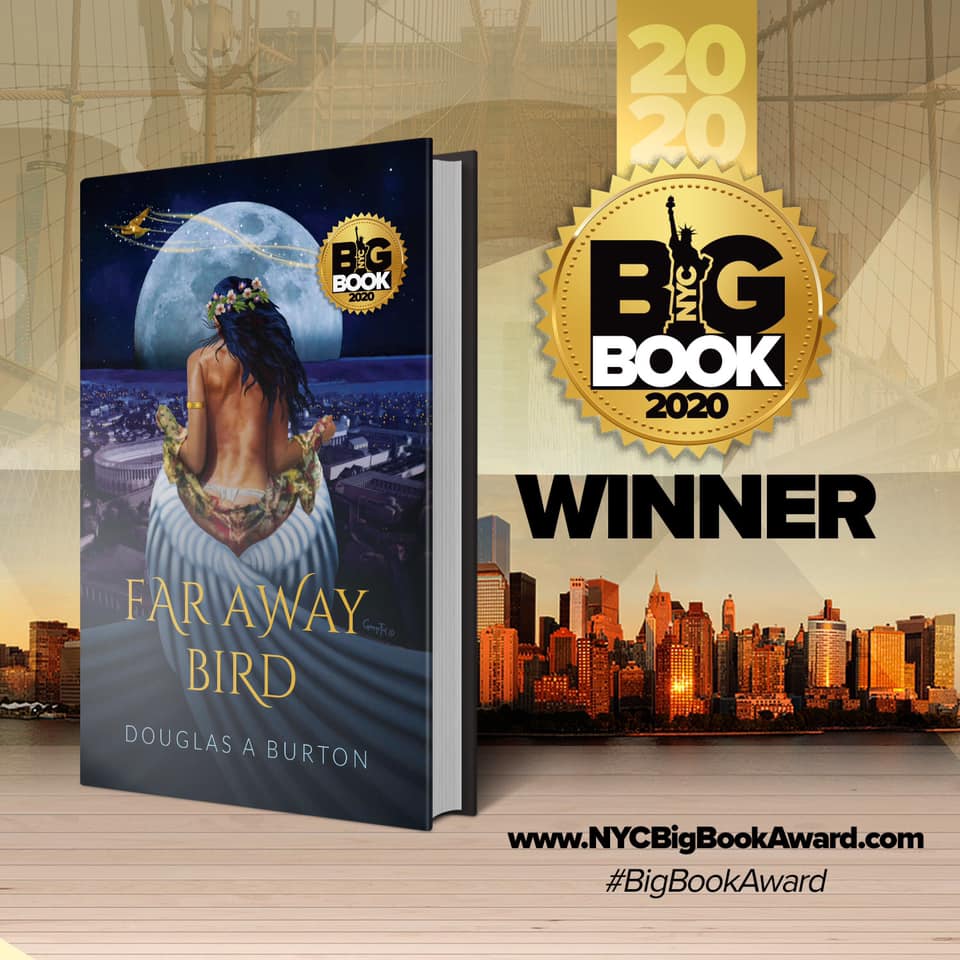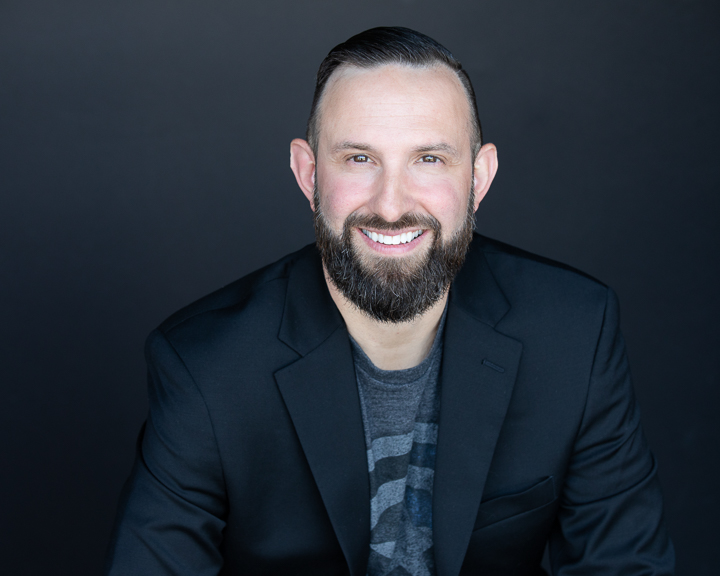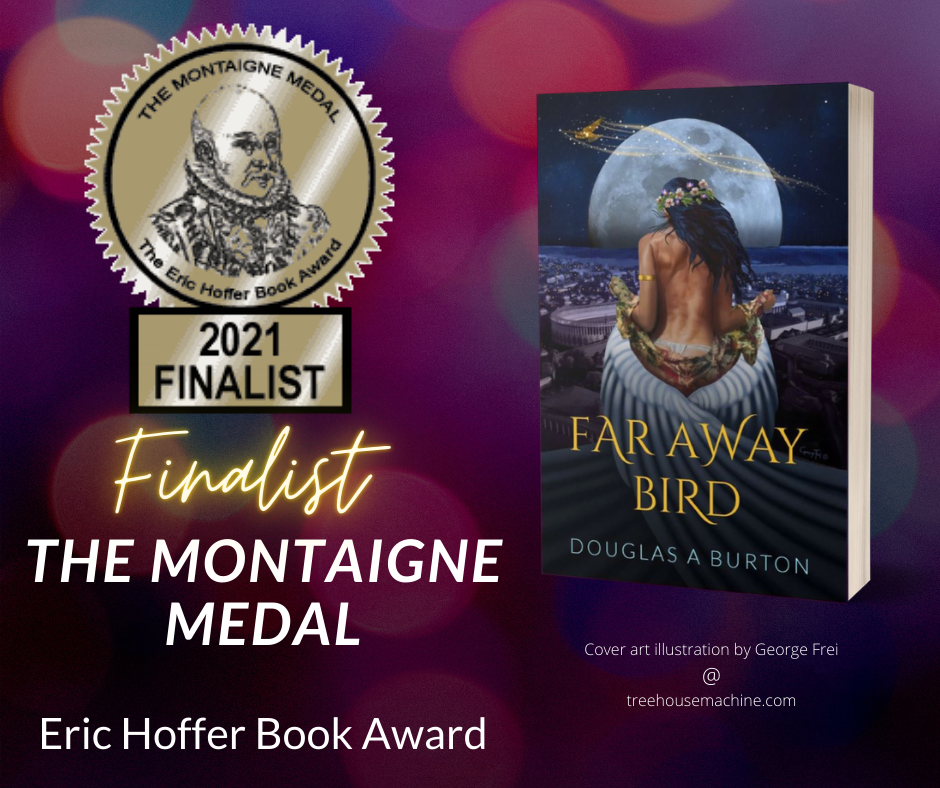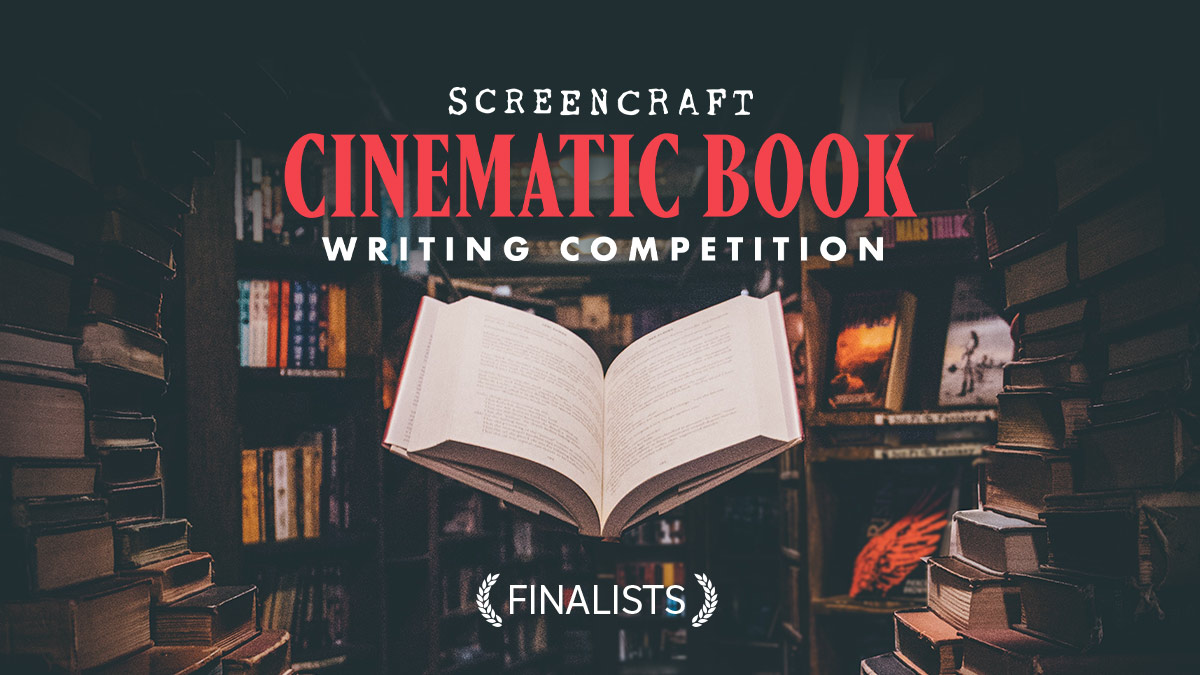Media
Doug in the News
The 33rd Annual IBPA Ben Franklin Awards
Gold Medal Winner – Best New Voice in Fiction

You say that Theodora had an impact on women’s rights, how so?
The laws passed during her tenure as an empress are impressive and are more in line with modern legal protections. First off, rape was made punishable by death. And when you follow the attempts made to circumvent these laws, she consistently responded with interventions. It was a chess match between her vision for women’s protection and society’s efforts to undermine her vision. But she had an almost inexhaustible will. When the world pushed Theodora, Theodora always pushed back. She also improved women’s rights in marriage, nearly across the board. She truly seemed driven to create equal power between women and men. I wrote a blog that details out all the big and little laws that changed during her reign. It’s worth reading because at times she sounds like a modern woman who was sent back in time. She’s thoroughly impressive.
You chose Theodora as your lead character and wrote the book from her point of view. Why did you choose a woman and not a man?
I honestly don’t feel like I “chose” Theodora. I had extensive knowledge of multiple historical figures from the Sixth Century Byzantium, the main ones being Emperor Justinian, General Belisarius, and then Empress Theodora. In truth, I spent most of my life trying to write a novel centered on Justinian or Belisarius. However, I had gone through a life-changing calamity back in 2008, 2009. And when I revisited Theodora, for some reason, I saw her differently. I saw a tragic figure, a human being who had a tough life and managed to succeed at the highest level. She was a prostitute who lived in an impoverished part of Constantinople. Her gender, her poverty, her social status, her profession (prostitute), and legal status all worked against her. This woman had literally nothing to help her in society except herself. Supported by nothing, she overcame pretty much everything. And at one point, she was arrogantly outgoing and underwent a profound change. She felt familiar to me. The fact that she was a woman never really bothered me, but I’ve noticed that many people ask me this question. And to be candid, I had a lot of help with Theodora. Multiple women stepped forward to help me with many critical details. So, this wasn’t a solitary effort, but a collaboration of many who made Theodora come to life in the novel.
Did writing the book from a woman’s point of view change anything for you, maybe cause you to see something in a new light?
I would say that writing about Theodora undeniably changed me and caused a radical shift in my awareness. While writing this novel, many, many women stepped in and helped me understand Theodora. I simply could not have gotten Theodora right without their help, their insights, and perspectives. And let me tell you, even tiny, subtle changes in my perspective led to dramatic changes into the story line and character arcs. Truly amazing. My intense open-mindedness to the feedback of my female friends, peers, and acquaintances taught me a ton. I became a better writer. My intrigue into heroic women has even led me to study heroines in pop culture. My next book will explore heroines and their portrayal in film and story. I’m actually really excited about that. You can check some of it out now on my website. I’m calling my study of heroic women The Heroine’s Labyrinth.
Since you have a pre-existing career, do you view writing as a hobby?
No. I’ve been writing since about 4th grade. Like most writers, I wrote story after story but rarely finished much. But I got real serious about writing about ten years ago and now view it as a second career. I make time to write and defend that time the same way I would defend my time at my other job. I sometimes wake up at 4 a.m. to make it work. That time slot doesn’t force me to choose between writing, work, social, community, or family. I can focus on just writing.
What have you done to improve your writing?
The easy answer is, I write. But all writers know that blind writing for the sake of writing can feel tedious and sometimes unrewarding. The truth is that you should write as much as possible, but with purpose. Have a goal. Get something right. Try something different. Secondly, I read. Reading may be as important as writing itself. Reading totally expanded my imagination and opened up my mind to entire new worlds. Reading creates that space in the mind that is as expansive at the area you need to write your own stuff. I’ve been a subscriber to Audible.com since 2003, which is a service engrained into my lifestyle at this point. I read about two books a month on average with my favorite categories being historical fiction, economics, and fantasy adventure. As far as books on writing go, I’ve also read the big books out there, with some notable ones making a big difference. The best were: Stephen King’s On Writing, Anne Lamont’s Bird by Bird, William Strunk Jr. and E.B. White’s The Elements of Style, and Natalie Goldberg’s Writing Down the Bones. Another big turn for me came after listening to Brooks Landon’s Building Great Sentences. It’s one of the Great Courses offered on Audible.com. In it, he makes a strong case for writing longer, more elaborate sentences, something called the cumulative sentence. That concept alone undeniably improved my writing and has become part of my style. Finally, you have to open yourself up to other writers. Critiques and line edits will help you create better habits and clean up your writing.
Why have you chosen to write about the Byzantine Empire?
Pure fascination. When I was a junior in high school, I grabbed a book called Constantinople: Birth of an Empire by Harold Lamb. I had a study hall and was just trying to pass the hour. But when I opened the book, I discovered a world that seemed nearly as fantastic as Middle Earth. The Byzantines seemed more like a fantasy version of the Roman Empire. I found a Roman Empire divorced from Europe, with people who spoke Greek, not Latin. Mystical Christianity rubbed up against the last generations of pagan people. White people were unruly barbarians, and the Middle East was the center of the civilized world. I could not get enough. Secondly, the Byzantines had their own story. The city of Rome, which had always been a city like an idol, had been smashed into pieces and the new capital was in Constantinople. Therefore, the Byzantines were survivors of a failed empire, tasked with the continuation of civilization itself, even though they were not the founders. Yet the Byzantines ruled a society that lasted over one thousand years. Again, I could not get enough. My fascination with Byzantium fills the pages of my upcoming novel, and I hope to inspire others to look into this amazing and forgotten world.
Do you have any follow-up books planned for Theodora?
Definitely. I already have the treatment for Book 2 as well as several chapters. Research plays such a huge role, so it just takes time. Book 1 was about Theodora’s early life. Who she was, how she fit into the world, and most importantly, what was behind the dramatic transformation that took place in this woman’s life. It’s really incredible. Book 2 moves into the palace and follows her entrance into not just the aristocracy, but a position of power. I will trace her ability to influence laws that can be described as women’s rights, and how she handles society pushing back against all these reforms. The book centers around the Nika Revolt, which is the bloodiest rebellion in Byzantine history by a landslide. I can’t wait to finish Book 2.
Well, tell me about that. What is the Heroine’s Labyrinth?
I’m pretty excited about this. Many people have heard of Joseph Campbell’s work on the Hero’s Journey. If you haven’t heard about it, the Hero’s Journey is what Campbell calls a monomyth,” which is an awesome phenomenon in storytelling. He noticed a recurrent set of themes and events found in stories across culture and time. Nearly every culture has a version of Luke Skywalker but draped in the rich language and details of the culture itself. For the first time, perhaps in history are we seeing an overwhelming number of women in lead roles at the movies. There’s a cultural shift taking place right now. Well, over the course of my studying female heroines, I kept analyzing their heroic quests under the Hero’s Journey model and feeling like these women were sometimes incomplete. However, I later realized something else. I discovered what I believe to be an alternative model for female-oriented heroines quite by accident. These heroines weren’t on the Hero’s Journey. They had their own reality and their own set of recurrent themes. They were more heroic than I thought; I was just judging them with the wrong measuring stick. The themes are so powerful that I realized I may have inadvertently noticed a parallel monomyth, one that perhaps had always been there. That’s the Heroine’s Labyrinth.
Is the Heroine’s Labyrinth exclusive to women?
Emphatically, no. Men can follow the Heroine’s Labyrinth, and women can follow the Hero’s Journey. There’s nothing binding any gender to any storytelling model. In fact, some of the best stories pull certain themes out of both models. Women can undergo the Hero’s Journey, and men can be trapped inside the Heroine’s Labyrinth. Most superhero movies follow the Labyrinth model since the protagonists are often facing masked villains who terrorize the native culture, rather than taking an exotic journey to a far off place to fight an “outsider” villain. I think we all can identify with both storytelling paradigms to varying degrees. But studying heroines is what triggered the whole line of thoughts, or I should say tree of thoughts. So, that’s why I named it after heroines.
There’s actually been some backlash against the Hero’s Journey. I’ve read more than one article that says its obsolete or even a bad model with negative side effects. What are your thoughts?
Well, the backlash is really against the concept of a one-size-fits-all formula, which I actually agree with. There’s also the belief that the Hero’s Journey is kind of male-centric and leads to demonizing entire groups of people, etc. The critics all have a point. But the Hero’s Journey isn’t a formula, like some mathematical equation. The themes in the Hero’s Journey are timeless. It’s a storytelling ecosystem with a whole range of recurrent themes. Storytellers can and should pick whatever fruit from this tree they want. Keep in mind…whether we’re talking about the Hero’s Journey or the Heroine’s Labyrinth, these aren’t architectural plan that some person just made up. These are existing themes that unconsciously recur in the stories that human beings tell each other. The themes are part of us. We can’t change the core make-up of our shared human nature. That’s the best part. It’s why human beings collectively spend almost three billion dollars to see The Avenger’s Endgame, or any other film for that matter. We see something up on that screen that we relate to, whether its Captain America or Captain Marvel, Black Panther, Wonder Woman, the list goes on and on. In the end, those big-name superheroes are exaggerated versions of ourselves. It’s why we cry at the end.
Back to your book. Did you use these storytelling paradigms when you wrote your novel?
One-hundred percent. I included the powerful themes of the Hero’s Journey when they pertained to Theodora, and I deviated when they didn’t. I followed my intuition for the sake of character and story, but I was well versed in the concepts and patterns behind the Hero’s Journey. And guess what? I finished the book a year ago and only recently did I start to shape out the core concepts and themes of the Heroine’s Labyrinth. When I retrospectively examined my own book, “Far Away Bird,” I realized that I unconsciously followed the Heroine’s Labyrinth paradigm as well. It’s just there. It bubbles up from our subconscious psyche, just like dreams do.
What about the idea of stereotyping? Aren’t archetypes damaging to people if they suggest that there’s a certain way we must be? Telling people that there’s a specific model might not be helpful if they don’t fit that model.
ut they do fit a model. They fit their model. Keep in mind though, there’s real life, and there’s fiction. I’m talking about the fiction side of it. But I get the parallel you’re making. You’re saying that the way archetypes are portrayed in movies, let’s say, model behavior and personalities that viewers make try to emulate. I definitely believe that people can feel isolated when they don’t fit a specific model. The damage doesn’t come in portraying or even perpetuating certain archetypes. The damage comes from telling someone, “you’re this archetype,” or “you have to be this way.” If you believe that a person doesn’t fit any human pattern what-so-ever, that’s fine, but you’re probably wrong. The overwhelming chances are that you share something, if not a lot of things, with the rest of humanity. If you don’t, then how can anyone else relate to you? And if you resent humanity and patterns and wish to rebel against anything that, at least in your mind, represents a kind of oppressive social construct or suggestion of conformity to some preexisting something, well, then you’re not alone. That’s archetypal too. In fact, I agree with that belief, that there’s no one way or one type for all of us. I’m saying there’s a massive range of human behavior, a massive range of different archetypes, and almost all of it recurs somewhere, in life and in story. Studying it is useful and good.
How then would you address the avant-garde? How can change occur? Or how can new models and progress be ever be made if we rehash the same things in our stories?
We really don’t, though. Storytelling to me is the balance of being inclusive of timeless human themes while also introducing something avant-garde, something new. I love both! The avant-garde actually needs those timeless, preexisting, conforming elements if it is to do its job, which is to introduce concepts of change. The avant-garde is never 100% new. It must be relatable and understandable in some way, otherwise, we couldn’t connect to it. The story wouldn’t change us because there’s nothing of us in it. Just like the one-size-fits-all model alienates the person who doesn’t connect to it, total avant-garde, total originality risks alienating everyone else who can’t connect or relate to it. Recurrent themes in story are one way to introduce powerful tropes that human beings experience together through all generations and in all cultures. The avant-garde challenges some part of a preexisting order. But we must have both. The magic ingredient of time will change us all whether we like it or not, whether it’s day by day or chapter by chapter. The world changes because people change and great stories capture that change
Finally, where can we buy your book?
You can buy the book, eBook, or paperback on Amazon right now, and the audiobook is available on Audible.com. I highly recommend the audiobook too. Mary Sarah performs the novel brilliantly and truly brings Theodora and Byzantium to life. We also have original music for the audiobook that really sets the tone.



